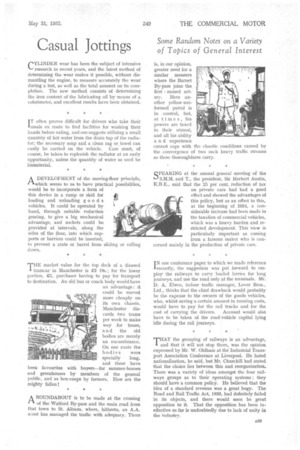Casual Jottings
Page 57

If you've noticed an error in this article please click here to report it so we can fix it.
Some Random Notes on a Variety of Topics of General Interest
rYLINDER wear has been the subject of intensive
research in recent years, and the latest method of determining the wear makes it possible, without dismantling the engine, to measure accurately the wear during a test, as well as the total amount on its completion. The new method consists of determining the iron content of the lubricating oil by means of a colorimeter, and excellent results have been obtained.
I T often proves difficult for drivers who take their meals en route to find facilities for washing their hands before eating, and one suggests utilizing a small quantity of hot water from the drain tap of the radiator; the necessary soap and a clean rag or towel can easily be carried on the vehicle. Care must, of course, be taken, to replenish the radiator at an early opportunity, unless the quantity of water so used be immaterial.
A DEVELOPMENT of the moving-floor principle, 1-'which seems to us to have practical possibilities, would be to incorporate a form of
this device in a ramp or skid for loading and unloading goo d s vehicles. It could be operated by hand, through suitable reduction gearing, to give a big mechanical advantage, and sockets could be provided at intervals, along the sides of the floor, into which supports or barriers could be inserted, to prevent a crate or barrel from sliding or rolling down.
THE market value for the top deck of a disused tramcar in Manchester is 22 10s.; for the lower portion, 25, purchaser having to pay for transport to destination. An old bus or coach body would have an advantage : it could be moved more cheaply on its own chassis. Manchester discards two trams per week to make way for buses, and the old bodies are merely an encumbrance. On one route the bodies were 1111 NW II IP' TS lo
BM
t.._
1:
specially long, and these have been with buyers—for summer-houses and greenhouses by members of the general public, and as hen-coops by farmers. How are the mighty fallen! favourites
A ROUNDABOUT is to be made at the crossing r-k of the Watford By-pass and the main road from that town to St. Albans, where, hitherto, an A.A. scout has managed the traffic with adequacy. There
is, in our opinion, greater need for a similar measure where the Barnet By-pass joins the first named artery. Here another yellow-uniformed patrol is in control, but, at times, his powers are taxed to their utmost, and all his ability a n d experience cannot cope with the chaotic conditions caused by the convergence of two such heavy traffic streams as these thoroughfares carry.
QPEAKING at the annual general meeting of the S.M.M. and T., the president, Sir Herbert Austin, K.B.E., said that the 25 per cent, reduction of tax on private cars had had a good effect and showed the advantages of this policy, but as an offset to this, at the beginning of 1934, a considerable increase had been made in the taxation of commercial vehicles, which was a heavy burden and restricted development. This view is particularly important as coining from a famous maker who is concerned mainly in the production of private cars.
I N one conference paper to which we made reference recently, the suggestion was put forward to employ' the railways to carry loaded lorries for long journeys, and use the road only at the terminals. Mr. D. A. Elwes, indoor traffic manager, Lever Bros., Ltd., thinks that the chief drawback would probably be the expense to the owners of the goods vehicles, who, whilst saving a certain amount in running costs, would have to pay for the rail trucks and for the cost of carrying the drivers. Account would also have to be taken of the road-vehicle capital lying idle during the rail journeys.
THAT the grouping of railways is an advantage, and that it will not stop there, was the opinion expressed by Mr. W. Oldham at the Industrial Transport Association Conference at Liverpool. He hated nationalization, he said, but Mr. Churchill had stated that the choice lies between this and reorganization. There was a variety of ideas amongst the four railways groups as to their operating systems ; they should have a common policy. He believed that the idea of a standard revenue was a great bogy. The Road and Rail Traffic Act, 1933; had defuntely failed in its objects, and there would soon be great opposition to it. That the opposition has been ineffective so far is undoubtedly due to lack of unity in the industry.




































































































